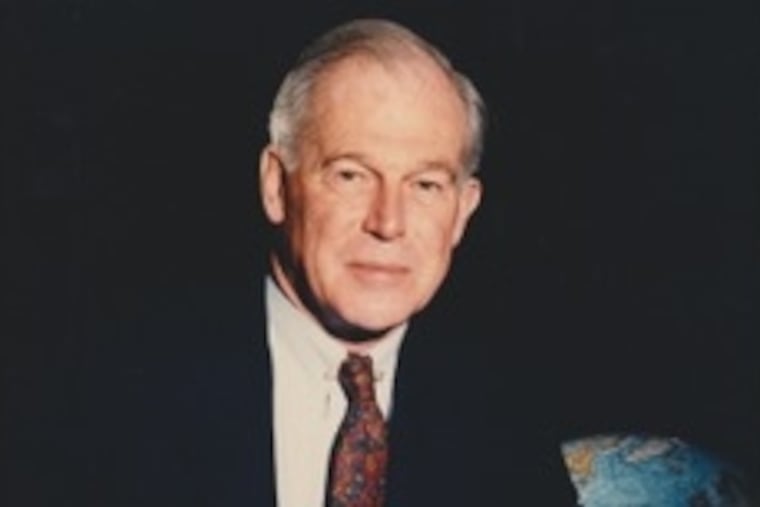Henry Wendt III, retired chairman at SmithKline Beecham, has died at 90
He helped turn the Philadelphia-based pharmaceutical company into one of the largest firms in the world and drew praise for his leadership. “Henry treated everyone with respect and listened to all viewpoints before making decisions,” a former colleague said in a tribute.

Henry Wendt III, 90, of Gladwyne, retired president, chief executive officer, and chairman of what became SmithKline Beecham pharmaceutical company, founder of Quivira Estate Vineyards and Winery, author, historic map collector, volunteer, and lifelong sailor, died Thursday, April 11, of complications from an infection at Waverly Heights retirement community.
Mr. Wendt started work as a pharmaceutical salesman for Philadelphia-based Smith, Kline & French Laboratories right out of Princeton University in 1955. He retired as chairman of SmithKline Beecham in 1994, and, in between, fashioned a 40-year career that featured stops in Philadelphia, Japan, Canada, Hawaii, and London, and positions as president at Smith Kline & French, and CEO and chairman at SmithKline Beckman Corp.
He oversaw the development of groundbreaking medications and corporate acquisitions, championed international investment, and helped structure the company’s blockbuster merger with London-based Beecham in 1989 that created the world’s second-largest pharmaceutical firm.
He directed the company’s expansion to Japan in 1965 and wrote Global Embrace: Corporate Challenges in a Transnational World that was published in 1993. In 1988, when he was named chairman of the U.S.-Japan Business Council, he told The Inquirer: “In any technology-based industry, the world market is the only relevant market to consider.”
Closer to home, Mr. Wendt embraced Philadelphia as SmithKline’s corporate headquarters. He supported educational initiatives by the School District of Philadelphia and promoted collaboration among local business leaders of all kinds. He also offered suggestions to boost the city’s economic condition.
Stories about him appeared often in The Inquirer and Daily News, and he said in a 1982 opinion piece for The Inquirer: “A comprehensive [economic] strategy worked out by the city administration with business and labor, reviewed and ratified by agencies of the state and federal governments, and then well-communicated and marketed can immeasurably improve Philadelphia’s attractiveness as a center of commerce and trade.”
He also worked in marketing and consumer products for Smith Kline & French. A former colleague said he was “absolutely the most brilliant and best leader we had at SmithKline during my career” in an online tribute. Another said: “His quiet demeanor and refinement enhanced his leadership qualities. He had a twinkle in his eye.”
Mr. Wendt and his wife, Holly, established the Quivira Estate Vineyards and Winery in northern California in the early 1980s, and the 90-acre vineyard had more than 35,000 grape vines and produced award-winning zinfandel and sauvignon blanc. They sold the vineyard in 2006.
He wrote books about his historic map collections and took his family sailing in the Chesapeake Bay, to the Virgin Islands, and elsewhere around the world. He was a board member and trustee emeritus at the Philadelphia Museum of Art, and donated one of his historic map collections to the Columbia River Maritime Museum in Oregon and another to the Princeton University Library.
He served on many boards and was a trustee at the American Enterprise Institute. He established chairs in East Asian studies at Princeton and political economy at the AEI, and sponsored a visiting scholar program at his high school, Hackley School in Tarrytown, N.Y.
He earned the 1983 Edward Powell Award for economic achievement in Philadelphia, the 1988 William Penn Award for business and civic contributions to the city, and a 1994 Order of the Rising Sun award from the government of Japan. In 1995, Queen Elizabeth II made him Honorary Commander of the Most Excellent Order of the British Empire.
A longtime friend noted his “intelligence, his thoughtfulness, and generosity.” His daughter Laura Mitchell said, “He had a great sense of humor, and he was honest, honest, honest.”
Henry Wendt III was born July 19, 1933, in Neptune City, N.J. He grew up in Sands Point and Tuxedo Park, N.Y., and played soccer, sailed, swam, and fished.
He earned a bachelor’s degree in American diplomatic history at Princeton in 1955 and considered working in the U.S. Foreign Service before joining Smith Kline & French. He met Holly Peterson through mutual friends while in college, and they married in 1956, and had daughters Laura and Chelsea.
Mr. Wendt enjoyed fly fishing and tennis. He went antiquing often on Sunday afternoons in Chester County and liked to read biographies and history books.
He talked often about his love for his wife of 67 years and shouted out to her once during an award acceptance speech. His daughter Laura said: “He was the most hopeless romantic in the world.”
A friend said in a tribute: “He was the nicest man you would ever want to meet.” His daughter Laura said: “He showed me the world.”
In addition to his wife and daughters, Mr. Wendt is survived by three grandchildren, two great-grandchildren, two sisters, and other relatives. A sister died earlier.
Private services are to be held later.
Donations in his name may be made to the Philadelphia Museum of Art, 2600 Benjamin Franklin Parkway, Philadelphia, Pa. 19130.